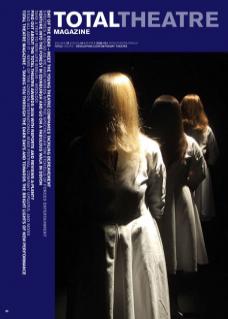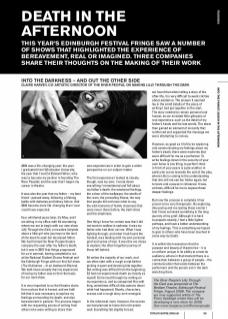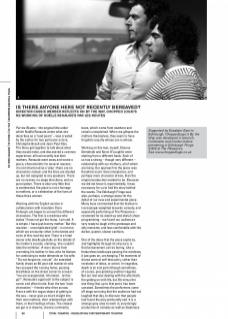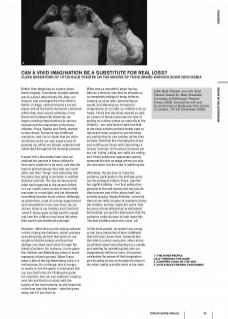Into the darkness – and out the other side
Claire Harvey, co-artistic director of The River People, on making Lilly Through the Dark
2004 was a life-changing year: the year I graduated from Winchester University; the year that I met Ed (Edward Wren, who was to become my partner in founding The River People); and the year that I began my career in theatre.
It was also the year that my father – my best friend –passed away, following a lifelong battle with diabetes and kidney failure. And 2004 became more life-changing than I ever could have expected.
Four whirlwind years later, it’s May, and I am sitting in my office with Ed wondering where we are to begin with our new show Lilly Through the Dark, a macabre fairytale about a little girl who journeys to the land of the dead to seek her deceased father. We had formed the River People theatre company the year after my father’s death, but it was in 2007 that things progressed for us in earnest, having completed a run at the National Student Drama Festival and the Edinburgh Fringe with our first full show (The Ordinaries – In an Awkward Silence). We both knew already that my experience of losing my father was to form the basis for our next show.
It is very important to us that theatre starts from a place that is honest, and we both felt that it was necessary to explore my feelings surrounding his death, and also bereavement in general. The process began with me requesting pieces of writing from others who were willing to share their own experiences in order to gain a wider perspective on our subject matter.
The first experience I looked at closely, though, was my own. I wrote down everything I remembered and felt about my father’s death: the emotional feelings, the colour of the wallpaper, the smells of the room, the preceding illness, the way that people did not know what to say, the odd moments of family closeness that were never there before, the dark times and the emptiness.
One thing I knew for certain was that I did not want to wallow in sadness: it was my father who had died, not me. What I was fighting through, and what I had found the hardest, was dealing with my own personal grief and sense of loss. It was this we chose to explore; the often forgotten journey of those left behind.
Ed writes the majority of our work, and we often start with a rough script before picking it apart and devising bits together. But writing was difficult from the beginning; Ed had not experienced death as closely as myself. So he read through my writing on my experience, and accompanied this with long, sometimes difficult discussions about what had happened. Slowly, characters, scenes and a rough story arch emerged.
In the rehearsal room, however, the scenes we had planned at home did not transfer well. Everything felt slightly forced; we found that when telling a story of the after-life, it is very difficult to avoid clichés about existence. The answer it seemed lay in the small details of the piece of writing I had put together at the start. The story needed to remain personal and honest, so we included little glimpses of real experience, such as the detail of my father’s hands and his last words. The show then gained an element of sincerity that reinforced and supported the message we were attempting to convey.
However, as good as it felt to be exploring and communicating my feelings about my father’s death, there were moments that were difficult for me as a performer. To write feelings down in the security of your own home is one thing; to perform them in front of your peers is quite another. A particular scene towards the end of the play, where Lilly is coming to the understanding that she will not see her father again, led to tears and a pause in rehearsal. It was, at times, difficult for me to expose these deeper feelings.
But now the process is complete it has proven to be very therapeutic. By exploring, discussing and recreating these events I feel I have achieved something in the long journey of my grief. Although it is hard to pinpoint exactly, I feel a little lighter perhaps, and have a better understanding of my feelings. This is something we hoped to give to others who have been touched in some way by death.
It is within this transaction that the purpose and beauty of theatre lies – it is an artform unique in its ability to arrest its audience, where in that moment there is a connection between a group of people – the communication that exists between the performers and the person sat in the dark watching them.
Is there anyone here not recently bereaved?
Director Cassie Werber reflects on By the Way, Chopped Logic’s re-working of Noëlle Renaude’s Par Les Routes
Par les Routes – the original title under which Noëlle Renaude wrote what she describes as a ‘road poem’ – was created by the author for two particular actors, Christophe Brault and Jean-Paul Dias. The three got together to talk about what they would make, and discovered a common experience: all had recently lost their mothers. Renaude went away and wrote a piece, characteristic for several reasons: it is not structured as a ‘play’; there are no characters named, and the lines are divided up, but not assigned to any speakers. There are no scenes, no stage directions, and no punctuation. There is also very little that is sentimental; the piece is not a homage to mothers, or a celebration of the lives of these three women.
Working with the English version in collaboration with translator Clare Finburgh, we began to unravel the different characters. The first is a waitress who states ‘I have not got the hump. I am sad. It is simple. I have just lost my mother.’ But this reaction – uncomplicated grief – is not one which we encounter often in the twists and turns of this road trip text. There is a hotel owner who dwells gleefully on the details of his mother’s suicide, claiming, ‘she couldn’t take the wrinkles’. A man returns from cremating his mother-in-law, who he blames for continuing to make demands on his wife: “ Do not forget me, not yet”. An extended family chase an 80-year-old matriarch who has escaped the nursing home, pausing breathless on the street corner to scream: “we are exasperated, infuriated…let her go!”. Renaude’s approach to the subject is comic and often brutal. Even the two ‘main characters’ – friends who drive across France with the vague object of getting to the sea – never give us much insight into their own mothers, their relationships with them, or their feelings of loss. The closest we get is in dreams, chance comments, tears, which come from nowhere and remain unexplained. When we glimpse the mothers themselves, they seem to have forgotten exactly whose son is whose.
Working on this text, myself, Stavros Demetraki and Kevin O’Loughlin were starting from a different basis. Each of us has a strong – though very different – relationship with our mothers, all of whom are living. Our approach to the piece was therefore much more interpretive, and perhaps more character driven, than the original production needed to be. Because we did not know it, experientially, it was necessary for us to find the story behind the words. The Edinburgh Fringe was also, perhaps, a strange place for the debut of our new and experimental piece. Many have commented that the festival is increasingly weighted towards comedy, and especially performing at The Pleasance – renowned for its stand-up and sketch show programming – we found our audiences very ready to laugh at the grotesque and silly moments, and less comfortable with the darker, quieter, slower sections.
One of the ideas that the piece explores, and highlights through its structure, is that bereavement can be boring. Like a featureless landscape passing the windows, it just goes on, unchanging. The moments of drama were of self-discovery, rather than revelation of ideas, or action. In tragedies, death is an end point (though sometimes, of course, precipitating another tragedy). But our text was dealing with the aftermath, the getting on with life, but life minus the one thing that, up to that point, has been constant. Sometimes the performers came off stage worrying that the audience had not laughed that day, to discover that people had found the play profoundly sad. It is a strange grey area to work in, surprisingly productive of comedy as well as bleakness.
Can a vivid imagination be a substitute for real loss?
Clare Beresford of Little Bulb Theatre on the making of their award-winning show Crocosmia
Rather than beginning as a piece about family tragedy, Crocosmia, actually started out as a piece about family life. Alex, our director, had envisaged from the offset a family on stage, centred around a record player and all the family memories contained within their vinyl record collection. From those two fundamental elements, we began creating improvisations to various records and the characters of the three children, Freya, Sophia and Finnly, started to take shape. Everyone has childhood memories, and I've no doubt that we were all influenced by our own experiences of growing up, which we shared, explored and celebrated throughout the devising process.
It wasn’t till a few weeks later, that we realised the parents in these children’s lives were nowhere to be seen, and that the level of protectiveness they had over each other and their 'things' was indicating that the piece was going to be taken in another direction entirely. The day we discovered what had happened to the parents (killed in a car crash), every action of each child was seen in a new light, and yet ultimately everything became much clearer. Although, as performers, none of us have experienced such devastation in our own lives, we are all very close to our families and I think the 'what if' factor gave us that horrific insight into how the children must have felt when their world was shattered overnight.
However, rather than purely seeing sadness in their coping mechanisms, which overlays everything they do from that point on, we sought to find the beauty and love that siblings can show each other through the tiniest of actions. For instance, in one game the children use Battenberg cakes to enact memories of their parents. When Freya takes a bite of the big Battenberg cake, it is not because, for a change, she is hungry, or wants to ruin the game, it is because she can see that Finnly isn’t finding the game fun anymore; she can see sadness creeping over him and that he is stuck with the burden of the next memory, so she helps him in the best way she knows – take the game away, eat it if you have to.
What was so wonderful about having Alex as a director was that he allowed us to completely indulge in being children, treating us as an older parental figure would, and allowing our characters’ imaginations to run wild, as children’s do so freely. I think that the show worked so well as a piece of theatre because the idea of putting on a show comes so naturally to the children – you only have to take one look at the shoe and the perfume bottle used to represent foster parents to see that they are performing for one another all the time anyway. Elements like changing the music and scoffing our faces with cake brings a unique 'liveness' to the piece, because we are not 'acting' eating, we really are eating, and I think audiences appreciate seeing moments like this on stage where not only the character, but the actor is suffering too.
Ultimately, the decision to make the audience participate in the birthday party (as the youngest orphan, Freya, reaches her eighth birthday – her first without her parents) at the end means that not only do they become part of the show itself, but actively singing 'Happy Birthday' connects them to the roller-coaster of emotions felt by the children as they create the event. And because of everything they've witnessed beforehand, you get the impression that the audience really do want to help make this 'the best birthday what she's ever 'ad'.
I think most people, no matter how young or old, have memories of their childhood that will never leave them, moments like this which connect everyone, when all we could think about was blowing out a candle and wishing for something that only our imaginations will let us have. Crocosmia celebrates the power of that imagination and its ability to see us through the times in life when reality just falls short of the mark.
The River People’s Lilly Through the Dark was presented at The Bedlam Theatre, Edinburgh Festival Fringe, August 2008. The company are now supported artists of The Point, Eastleigh where they will be developing a new show for 2009. See www.myspace.com/theriverpeopl
Supported by Escalator East to Edinburgh, ChoppedLogic’s By the Way was developed in Ipswich, Colchester and London before premiering in Edinburgh Fringe 2008 at The Pleasance. See www.choppedlogic.co.uk
Little Bulb Theatre won the Total Theatre Award for Best Graduate Company at Edinburgh Festival Fringe 2008. Crocosmia will next be performed at Battersea Arts Centre in London, 18–20 December 2008.



